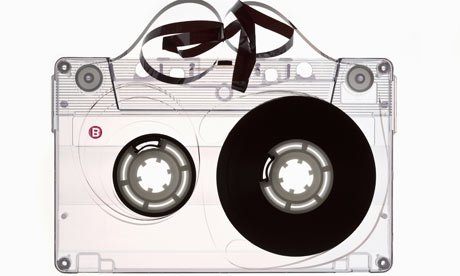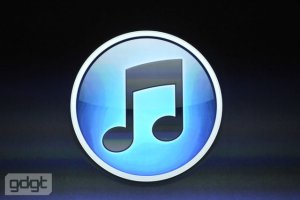Og Musicassette er på vei tilbake?
http://www.rhizome.org/editorial/2868
Artikkel i The Guardian.
Masse fine kommentarer til artikkelen under. Som HFSere som har vært på besøk hos meg har hørt, er det ganske fine stemmer å høre fra Musicassette.
:
http://static.guim.co.uk/sys-images/Guardian/Pix/pictures/2010/3/29/1269883821038/cassette-001.jpg
Return of the audio cassette
Just when you thought it was dead, the audio cassette is catching the imagination of music fans again. So what's making us pause and rewind?
During its heyday, the audio cassette was easy to take for granted. It was cheap, portable and simple to duplicate but, unlike a vinyl album, never a thing of beauty. It always seemed so disposable, and was prone to unspooling in a spew of magnetic spaghetti, thus requiring laborious restoration with the aid of a pencil.
But just as it is facing extinction, the clunky old cassette has been reborn. Last year, feted indie bands Deerhunter and the Dirty Projectors both took the unusual step of putting out albums on cassette, and Universal made the celebrity poetry album Words for You Britain's first major-label cassette release in six years. The 6 Music DJ Lauren Laverne celebrates old compilations on her regular Memory Tapes feature. In the US, there are hundreds of underground labels that specialise in the format and package it with a degree of artistry never witnessed in the old Woolworths bargain bin. In the era of iPods and bitrates, the cassette has become the fragile repository of a generation's affection for the analogue age. You can buy iPod cases, T-shirts, computer hardware and even jewellery that pays tribute to its iconic shape.
British record labels began releasing cassettes in October 1967, shortly after the electronics giant Philips perfected the design, and it took off as a mass-market medium after the introduction of the Sony Walkman in 1979. Between 1985, when it overtook vinyl, and 1992, when it was eclipsed by CDs, it was the most popular audio format in the country. But sales collapsed towards the end of the 90s and major labels abandoned the cassette in 2003.
Universal's decision to press 4,000 cassettes of Words for You was prompted by requests from older listeners who didn't use CDs, let alone MP3s. But specialist cassette labels, which have boomed over the last two years, are born out of choice rather than necessity, quixotically running off limited-edition tapes on stacks of secondhand decks. The low cost is just one factor. Once derided by audiophiles, cassettes are now cherished for their imperfections. The way the sound subtly warps and mutates over time does no favours to Lady Gaga, but it breathes extra vibrancy into lo-fi, experimental music.
"I grew up listening to tapes," says Canadian Al Bjornaa, who set up his label Scotch Tapes in 2008. "It was kind of cool how each tape sounded different depending on what cassette deck you used." Bjornaa even reuses old cassettes as well as fresh blanks. "You can sometimes still hear the original music playing behind the new tracks. It adds a certain something that makes each cassette unique." And unlike MP3s, which encourage the listener to dismantle albums into their constituent tracks, the cassette "helps preserve the notion of 'the album' as a complete work of art."
Bjornaa admits that nostalgia plays a part. People old enough to remember the importance of cassette labels in the post-punk years (one indie genre, C86, even took its name from a tape sold via the NME) are aligning themselves with a long DIY tradition. They are also the home-taping generation. An iTunes playlist, easily burned on to multiple CDs, can never be a labour of love in the same way as a mix tape brought to life through hours hunched over the pause button, perfecting clunk-free segues.
Children of the 80s, too, are affectionately revisiting the format on which they first discovered music. "What you grew up with just sounds right," says 22-year-old Brad Barry, a student at the University of Texas who hosts a weekly cassette-only radio show called C60 Radio. Meanwhile, people who sport cassette-themed Urban Outfitters' T-shirts or iPhone cases are just using it as a retro prop in the never-ending 80s revival.
Clearly, nostalgia alone won't reverse the cassette's commercial nosedive, but that's rather the point. While an MP3 can travel around the globe within hours of release, tapes inhabit the cloistered world of the true underground although, ironically, most are sold online. "It keeps it from becoming mainstream," says Barry. Faced with the bloodless convenience of digital music, it is human nature for some people to hanker after the cumbersome, the labour-intensive and the fallible to pause and rewind. The record industry, too, might have reason to look fondly on those plastic rectangles, now that the alarmist slogan "Home Taping Is Killing Music" is just a retro T-shirt design and digital piracy is wreaking financial devastation. If only they'd known.






